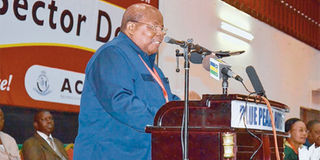OPINION: EA must break away from exploitation syndicate

No to bad deals: Former President Benjamin Mkapa has been vocal against the signing of Economic Partnership Agreements (EPA) between the EAC and EU saying they would derail development and weaken the bloc’s economies. PHOTO | FILE
What you need to know:
- Kenya is in a particularly precarious position. It is the only East African country without direct access to European markets under the latter’s “Everything But Arms” arrangement (EBA).
On the face of it, a lot has been taking place on the economic front to place East Africa on an international pedestal -- the chief event being the 14th Session of the UN Conference on Trade and Development (UNCTAD). In actual fact, however, there may be little to celebrate.
The UNCTAD conference, held in Nairobi from 17 to 22 this month, coincided with the disintegration of East Africa’s common position in reaching an Economic Partnership Agreement (EPA) with the European Union.
Trade is a matter that touches on bread and butter issues in any economy; while meetings are not unimportant, it is in the practical application of trade rules that a difference can be made.
Kenya is in a particularly precarious position. It is the only East African country without direct access to European markets under the latter’s “Everything But Arms” arrangement (EBA).
This is a scheme that was born in 2001 to give all least developed countries full duty free and quota-free access to the EU for all their exports with the exception of arms and armaments. This again means that unlike Kenya, the other East African countries can well do without signing an EPA.
While the ordinary people in the slums and streets of Nairobi may be suffering from poverty as much as those in Dar es Salaam or Kampala, they are allowed to boast that their country is considered fairly rich -- at least to the point of being considered a middle-income economy.
That classification, which is based on looking at the economy as a whole rather than per capita and human development indicators, obviously fails to appreciate the endemic poverty of a majority of the population.
The cynicism into which the people have sunk is palpable, and could be felt in the annoyance caused by the UNCTAD conference following the weeklong closure of some city streets.
The disruption caused to public transport and small businesses was felt by most Nairobi residents, who saw no benefit in the conference.
In fact, the organisers should probably have done city residents a favour and hosted the meeting at a venue outside the city centre – may be Gigiri or some other convenient venue.
Simply, the ordinary people have lost faith in endless meetings, international conventions and worthless seminars.
Who, then, are the beneficiaries of these almost meaningless meetings with agendas that keep being carried forward to the next meeting?
There are the hotels, of course, that make a tidy sum with each conference. The participants, too, and a host of organisations keen to show that they are doing something to make the world a better place.
But again, what are the concrete results on the ground? After long discussions on EPAs, it is all back to the beginning.
Similarly, despite numerous international gatherings of politicians, economists, cabinet ministers and high-level delegations, the Third World remains in an oppressive international trade order in relation to the developed countries of the West.
This is especially true of African countries. Unpopular and unworkable strategies are forced upon our poor countries using their malleable leaders.
In this manner, the West dictates what happens in poor countries, to their own advantage. The resulting distortion in trade works in favour of Western industries, creating even more poverty in poor countries.
The time has therefore come for East African countries, and the Third World as a whole, to speak with one voice and reject the imperialist agenda of poverty.
International meetings with high-sounding names by UNCTAD, the World Trade Organisation, the IMF, the World Bank and other international organisations will not solve the problems afflicting our people.
If anything, our countries end up in a deeper quagmire of debt, forcing them to rob Peter to pay Paul. The ultimate losers, of course, are the poor taxpayers in the developing countries.
Sadly, too, is the fact that most of these funds end up being squandered by corrupt elites in poor countries.
East Africa now needs to draft a common response to this global situation. Certainly, the region is not short of brilliant economists. But is the political will present?
Mr Isaac Mwangi contributes to the Arusha-based East African News Agency.




